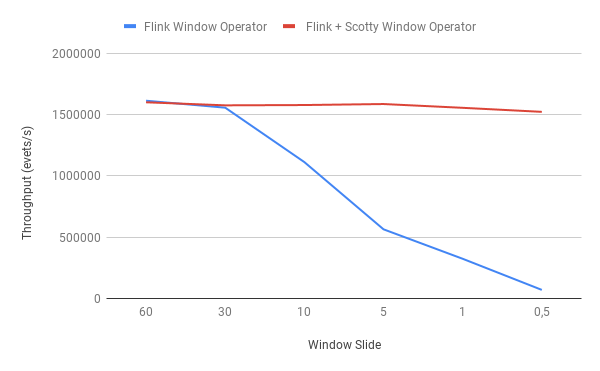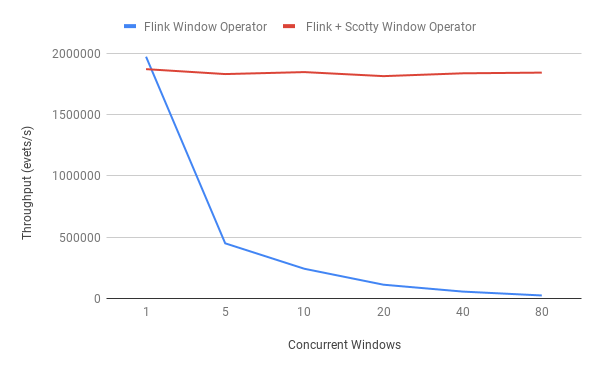Scotty: Efficient Window Aggregation for out-of-order Stream Processing 
This repository provides Scotty, a framework for efficient window aggregations for out-of-order Stream Processing.
Features:
- High performance window aggregation with stream slicing.
- Scales to thousands of concurrent windows.
- Support for Tumbling, Sliding, and Session Windows.
- Initial support for Count based windows.
- Out-of-order processing.
- Aggregate Sharing among all concurrent windows.
- Connector for Apache Flink.
- Connector for Apache Storm.
- Connector for Apache Beam.
Resources:
- Paper: Efficient Window Aggregation with General Stream Slicing (EDBT 2019, Best Paper)
- Paper: Scotty: Efficient Window Aggregation for out-of-order Stream Processing (ICDE 2018)
- Presentations Slides FlinkForward 2018
- API Documentation
Flink Integration Example:
// Instantiate Scotty window operator
KeyedScottyWindowOperator<Tuple, Tuple2<Integer, Integer>, Tuple2<Integer, Integer>> windowOperator =
new KeyedScottyWindowOperator<>(new SumWindowFunction());
// Add multiple windows to the same operator
windowOperator.addWindow(new TumblingWindow(WindowMeasure.Time, 1000));
windowOperator.addWindow(new SlidingWindow(WindowMeasure.Time, 1000, 5000));
windowOperator.addWindow(new SessionWindow(WindowMeasure.Time, 1000));
// Add operator to Flink job
stream.keyBy(0)
.process(windowOperator)Benchmark:
Throughput in comparison to the Flink standard window operator (Window Buckets) for Sliding Event-Time Windows:
We fix the window size to 60 seconds and modify the slide size.
If the slide size gets smaller, Flink has to maintain a higher number of overlapping (concurrent) windows.
Throughput in comparison to Flink for concurrent Tumbling Windows:
Roadmap:
We plan to extend our framework with the following features:
- Support for User-Defined windows
- User-defined window measures
- Support for Refinements
- Support of Flink Checkpoints and State Backends
Setup:
The maven package is currently not publically available. Therefore we have to build it from source:
git clone git@github.com:TU-Berlin-DIMA/scotty-window-processor.git
mvn clean install
Then you can use the library in your maven project.
<dependency>
<groupId>de.tub.dima.scotty</groupId>
<artifactId>flink-connector</artifactId>
<version>0.4</version>
</dependency>Efficient Window Aggregation with General Stream Sliching at EDBT 2019
General Stream Slicing received the Best Paper Award at the 22nd International Conference on Extending Database Technology in March 2019.
Abstract:
Window aggregation is a core operation in data stream processing. Existing aggregation techniques focus on reducing latency, eliminating redundant computations, and minimizing memory usage. However, each technique operates under different assumptions with respect to workload characteristics such as properties of aggregation functions (e.g., invertible, associative), window types (e.g., sliding, sessions), windowing measures (e.g., time- or countbased), and stream (dis)order. Violating the assumptions of a technique can deem it unusable or drastically reduce its performance.
In this paper, we present the first general stream slicing technique for window aggregation. General stream slicing automatically adapts to workload characteristics to improve performance without sacrificing its general applicability. As a prerequisite, we identify workload characteristics which affect the performance and applicability of aggregation techniques. Our experiments show that general stream slicing outperforms alternative concepts by up to one order of magnitude.
-
Paper: Efficient Window Aggregation with General Stream Sliching
-
BibTeX citation:
@inproceedings{traub2019efficient,
title={Efficient Window Aggregation with General Stream Slicing},
author={Traub, Jonas and Grulich, Philipp M. and Cu{\'e}llar, Alejandro Rodr{\'\i}guez and Bre{\ss}, Sebastian and Katsifodimos, Asterios and Rabl, Tilmann and Markl, Volker},
booktitle={22th International Conference on Extending Database Technology (EDBT)},
year={2019}
}
Acknowledgements: This work was funded by the EU project E2Data (780245), Delft Data Science, and the German Ministry for Education and Research as BBDC I (01IS14013A) and BBDC II (01IS18025A)
Scotty: Efficient Window Aggregation for out-of-order Stream Processing at ICDE 2018
Scotty was first published at the 34th IEEE International Conference on Data Engineering in April 2018.
Abstract:
Computing aggregates over windows is at the core
of virtually every stream processing job. Typical stream processing
applications involve overlapping windows and, therefore,
cause redundant computations. Several techniques prevent this
redundancy by sharing partial aggregates among windows. However,
these techniques do not support out-of-order processing and
session windows. Out-of-order processing is a key requirement
to deal with delayed tuples in case of source failures such as
temporary sensor outages. Session windows are widely used to
separate different periods of user activity from each other.
In this paper, we present Scotty, a high throughput operator
for window discretization and aggregation. Scotty splits streams
into non-overlapping slices and computes partial aggregates per
slice. These partial aggregates are shared among all concurrent
queries with arbitrary combinations of tumbling, sliding, and
session windows. Scotty introduces the first slicing technique
which (1) enables stream slicing for session windows in addition
to tumbling and sliding windows and (2) processes out-of-order
tuples efficiently. Our technique is generally applicable to a
broad group of dataflow systems which use a unified batch and
stream processing model. Our experiments show that we achieve
a throughput an order of magnitude higher than alternative stateof-the-art
solutions.
-
Paper: Scotty: Efficient Window Aggregation for out-of-order Stream Processing
-
BibTeX citation:
@inproceedings{traub2018scotty,
title={Scotty: Efficient Window Aggregation for out-of-order Stream Processing},
author={Traub, Jonas and Grulich, Philipp M. and Cuellar, Alejandro Rodríguez and Breß, Sebastian and Katsifodimos, Asterios and Rabl, Tilmann and Markl, Volker},
booktitle={34th IEEE International Conference on Data Engineering (ICDE)},
year={2018}
}
Acknoledgements: This work was supported by the EU projects Proteus (687691) and Streamline (688191), DFG Stratosphere (606902), and the German Ministry for Education and Research as BBDC (01IS14013A) and Software Campus (01IS12056).

